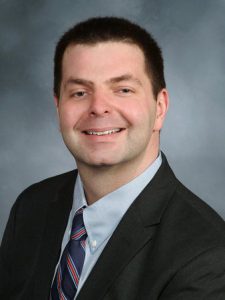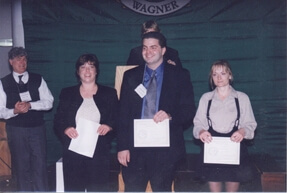BS Biology and Interdisciplinary Studies, BA Psychology 2000
Dr. Phillip Seibell currently serves as assistant professor of Psychiatry at Weill-Cornell Medical College/New York Presbyterian Hospital-Westchester Division, and as chief of partial hospitalization and intensive outpatient programs.
In his own words:
 As my studies progressed, it was important that I had excellent professors in biology and chemistry. I’ll never forget my amazing chemistry courses with Marilyn Parker and Robert Rouse during that initial time period. They were really that good at teaching challenging coursework. They weren’t the only ones. The teaching was student-centered throughout the institution, and it was clear that with dedication I would be successful. In fact, I ultimately decided to take on three majors and to join the Honors Program. In addition I was fortunate to have been selected to participate in summer programs at Robert Wood Johnson Medical School (RWJMS), and my career goal became clear: to become a physician.When I began my undergraduate studies at Monmouth in 1995, as the first in my family to attempt to obtain a college degree, it was clear that the opportunity presented had the potential to be life-changing on many levels. Needless to say, I was extremely motivated to make the most of it. The intimate feel of MU was great. I found that my professors had a strong interest in getting to know me as a student and individual, and they were willing to go above and beyond their call of duty to help me achieve my goals. One of my initial courses was Intro to Psychology with Jack Demarest, a psychologist with a strong interest in neuroscience who ultimately became a great mentor to me during my undergraduate career. One of the course’s requirements was to keep a journal, in which we wrote about articles we read. Jack taught us four perspectives on psychology: biological, behavioral, social, and psychodynamic. It was during the biological portion of this course that I read more about repetitive-behavioral disorders, including obsessive-compulsive disorder (OCD). OCD was a great condition to write about from a biological perspective because of the well-documented hyper-metabolic
As my studies progressed, it was important that I had excellent professors in biology and chemistry. I’ll never forget my amazing chemistry courses with Marilyn Parker and Robert Rouse during that initial time period. They were really that good at teaching challenging coursework. They weren’t the only ones. The teaching was student-centered throughout the institution, and it was clear that with dedication I would be successful. In fact, I ultimately decided to take on three majors and to join the Honors Program. In addition I was fortunate to have been selected to participate in summer programs at Robert Wood Johnson Medical School (RWJMS), and my career goal became clear: to become a physician.When I began my undergraduate studies at Monmouth in 1995, as the first in my family to attempt to obtain a college degree, it was clear that the opportunity presented had the potential to be life-changing on many levels. Needless to say, I was extremely motivated to make the most of it. The intimate feel of MU was great. I found that my professors had a strong interest in getting to know me as a student and individual, and they were willing to go above and beyond their call of duty to help me achieve my goals. One of my initial courses was Intro to Psychology with Jack Demarest, a psychologist with a strong interest in neuroscience who ultimately became a great mentor to me during my undergraduate career. One of the course’s requirements was to keep a journal, in which we wrote about articles we read. Jack taught us four perspectives on psychology: biological, behavioral, social, and psychodynamic. It was during the biological portion of this course that I read more about repetitive-behavioral disorders, including obsessive-compulsive disorder (OCD). OCD was a great condition to write about from a biological perspective because of the well-documented hyper-metabolic
brain circuit that exists in the condition.
I also sought out Dennis Rhoads, an invaluable mentor and advisor, and brought him an article that described the disruption of spontaneous alternation behavior (SAB) in rats as a simple animal
model of repetitive behavior in OCD. I set the lofty goal with Dennis and Jack of conducting a similar study as my Honors Program/senior thesis project. When both the right and left arms of a t-maze
are baited equally, rats tend to alternate in their choice of the arms of the t-maze – this is “spontaneous alternation behavior” – and it can be quantified. If a rat repetitively chooses one arm over the other, this is an indication that SAB, the behavior that rats typically engage in, is being disrupted. In addition, the time to make a choice of right or left arm of the maze can be measured. This behavior at the “decision point” is termed “vicarious trial-and-error behavior,” or VTE. We examined the effects of administration of agonists/partial agonists of specific serotonin receptor subtypes on SAB and VTE in the t-maze environment. I’m still amazed that Jack and Dennis were able to help me get this going, because at the time there were no other students interested in doing experiments on rat behavior, and the facilities were being renovated. Ultimately, with much time commitment and dedication, we were able to obtain enough data to make the study a success. I presented the results during my final year at MU at the Eastern Colleges Science Conference. I won the award for the best presentation in psychology, and at the NJ Academy of Science annual meeting I won the award for the best presentation in molecular biology. We published the results in Pharmacology, Biochemistry, and Behavior in 2003, an achievement I am still extremely proud of to this day.

My career at MU culminated in acceptance to the RWJMS class of 2004. I’ll never forget receiving the phone call about the acceptance – I was elated. It was exactly where I wanted to start the next chapter of my education. I had an amazing experience at RWJMS. Based on interests initially cultivated at MU and experiences on my psychiatry rotation, when the time came to choose a specialty, psychiatry was a natural choice. I completed residency training at the Mount Sinai School of Medicine in NYC, where I was able to see my initial interest in repetitive behavior through as I developed a specialization in OCD and related conditions (e.g., body dysmorphic disorder, or BDD). I eventually also developed a specialization in another area of psychiatry, eating
disorders, where obsessionality and repetitive behavior are prominent.
Currently I serve as assistant professor of psychiatry at Weill-Cornell Medical College/New York Presbyterian Hospital-Westchester Division. I am chief of our partial hospitalization and intensive outpatient programs. I also run an outpatient service that focuses on OCD and related conditions, anxiety disorders, and eating disorders. In addition to practicing specialized psychopharmacological management, I have received specialized training in cognitive-behavioral therapy (CBT) for OCD and related conditions, which is rooted in the behavioral principles that I initially learned in that Intro to Psych course at MU. I remain actively involved in research, writing/publishing, and presenting at national conferences. I am currently involved in an NIH-funded study of olanzapine vs. placebo in women with anorexia nervosa.
Being the first in my family to go to college, I consider myself to be extremely fortunate to have had such an amazing undergraduate educational experience, which truly set the stage for receiving an excellent medical education at RWJMS. I would like to thank my undergraduate mentors Dennis Rhoads and Jack Demarest as well as all of the amazing professors at MU who challenged me and helped me achieve my goals. They were life-changing experiences that I will never forget.

